On The ‘Throne Of Bones’: A Q and A With Vox Day
A Throne of Bones epic-fantasy author Vox Day discusses how he’s moved from columns to fiction, controversial novel content, and his criticism (not imitation) of A Game of Thrones.
Interviewer E. Stephen Burnett: Some years ago I recall seeing a headshot of this bald yet young columnist on the WorldNetDaily.com website. His first name was Latin for “voice”; he wrote as a “Christian libertarian.” Twelve years later, Vox, you’ve ended that column (but kept your blog) and say you prefer writing fiction. I can’t miss a chance to ask: why did you take that transition?
Vox Day: The time was right. First, I’ve lived in Europe a long time and I’ve been getting less and less interested in US politics. This is not a good thing for someone writing an op/ed column that deals regularly with American politics. Second, I conducted a little experiment last fall. I wrote a column I thought was really important on a book that has the potential to completely change how we think about economics. The following week, I wrote the dumbest, most simplistic column I could imagine. When the latter received ten times more traffic, comments, and Facebook likes than the former, I realized that I really needed to do something else. After A Throne of Bones came out in December 2012, I decided that I’d rather put more time into working on the next book in the series than spend it writing about the next Republican surrender on the debt ceiling.
ESB: On Sunday you wrote, “I could not care less about the so-called ‘Christian’ market. … While I am an evangelical Christian, I am not of the evangelical Christian culture.” What’s your story growing up — perhaps evangelical home, or adult convert? If the former, what could have kept you out of pervasive “evangelical Christian culture”? If the latter, what do you say makes you “evangelical” (a folk not yet well-known for their love of epic fantasy)?
Vox Day: I was raised in an evangelical Christian home, attended an evangelical church, and graduated from a private Christian academy. The experience was enough to put me off what passes for evangelical Christian culture for life and even drove me away from Jesus Christ for about ten years. I eventually came to the realization that one can’t reasonably judge the ism by the ists, particularly when the specific ism predicts and describes the fallen nature and inevitable failures of the ists. Seriously, though, if your kid likes AC/DC and you buy him a Sandi Patty album as a putative alternative, you may as well teach him to drink blood and sacrifice goats.
So, I was an adult convert in my late twenties. Before then, I’d been signed to the record label and music publisher that was the home of Ministry, Nine Inch Nails, and My Life with the Thrill Kill Kult and I’d been working in the computer game business for five years making 2.5D shooters. If I’m going to be in, but not of, any world, I am much more comfortable being in that particular one than in the world of evangelical culture. I would rather debate theological matters with an angry, Richard Dawkins-brandishing atheist than listen to a fellow Christian ramble on about how he personally approves of this or that Bible verse and “just thinks” the revealed wisdom of the Creator Lord of the Universe is “neat”.
Why do I describe myself as that which still occasionally gives me the willies? Because, to most people of my acquaintance, “evangelical Christian” doesn’t have a particular doctrinal significance, it simply means someone who genuinely believes in the tenets of the Christian faith and attempts to live by them as opposed to being a cultural Christian in the broad civilizational sense. Perhaps it’s not the right term in the American sense, but that’s the way that I usually hear the term being used in Western Europe.
ESB: You’ve written novels before, and your first with Marcher Lord Press was Summa Elvetica: A Casuistry of the Elvish Controversy, one of the first novels on which this speculative publisher took a chance. What’s that story, and the story behind it?
Vox Day: Jeff is an extraordinary risk-taker. It’s one of the things I like and admire about him. He contacted me when he launched Marcher Lord and said that he was very interested in publishing my fiction. I wasn’t interested at first because it was quasi-CBA and small press; I was publishing with Pocket Books at the time. However, I did have this insanely ambitious idea for bringing religion back into high fantasy, inspired by an essay I’d written for Ben Bella’s Revisiting Narnia anthology, entitled “CS Lewis and the Problem of Religion in Science Fiction and Fantasy.” I knew no one else would ever even consider publishing it, so I said I would write it if it was of any interest to him. He said yes, so I got to it.
Unfortunately, I completely failed. Originally, the plan was for this massive structural subtext in which each fantasy race represented a different medieval philosophical school, but I just couldn’t pull it off. The intellectual scope was far too grand; it took me a year just to get a decent grasp of Thomas Aquinas via the Summa Theologica. So, the book went from being philosophically vast to atomic; the novel is essentially nothing more than a single Aquinas-style argument concerning whether elves have souls naturally united to them or not. It’s still ambitious in its own way; structurally speaking, it could reasonably be argued that it is one of the most conceptually original novels published in SF/F for decades. But it’s a very small fragment of what it was first conceived to be and even that fragment is clumsily executed.
Still, most of the people who read it rather liked it as a modestly intellectual high fantasy tale. And it very much amused me that the only professional reviewer of the novel was clearly under the impression that the philosophical argument was one from the real Summa. At least I got that bit right.
ESB: What’s different between Summa Elvetica and your newest novel, A Throne of Bones?
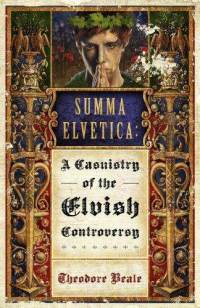 Vox Day: About 650 pages, for one thing. Summa Elvetica could be considered a long chapter in the life of one of the perspective characters in A Throne of Bones, the military tribune Marcus Valerius Clericus. In fact, it explains his agnomen, Clericus, which means “priest”. But the real difference is that I learned to stop being clever and to focus on the story instead of the subtext. The Wrath of Angels, for example, is a subtextual spin on the single European currency and the failure of the European elite to replace the pound sterling, but no one has ever picked up on that. I’ve found that the depth of the subtext tends to detract from the natural flow of the story, at least when written by an author of my admittedly limited talents.
Vox Day: About 650 pages, for one thing. Summa Elvetica could be considered a long chapter in the life of one of the perspective characters in A Throne of Bones, the military tribune Marcus Valerius Clericus. In fact, it explains his agnomen, Clericus, which means “priest”. But the real difference is that I learned to stop being clever and to focus on the story instead of the subtext. The Wrath of Angels, for example, is a subtextual spin on the single European currency and the failure of the European elite to replace the pound sterling, but no one has ever picked up on that. I’ve found that the depth of the subtext tends to detract from the natural flow of the story, at least when written by an author of my admittedly limited talents.
After A Dance with Dragons came out, I was talking with a friend who was as disgusted with that epic disappointment as I was, and he was lamenting that with Martin having gone south, there wasn’t anything worth reading in that genre. I always wanted to write a fat fantasy and figured I couldn’t do all that much worse than Martin had, so I decided I would return to the world of Summa Elvetica. This time, however, I would throw out the intellectual fireworks that no one seemed to notice or care about anyhow and focus solely on writing a good story with strong, memorable characters. I assumed I’d have to self-publish it, but I needed to get Marcher Lord’s permission first since it could be considered a sequel of sorts even though there is absolutely no need to read the earlier novel. All I was looking for was a release and I was shocked when Jeff said he wanted to publish it, even after I warned him that I intended for it to be around 300,000 words. He didn’t blink, not then, and not later when I turned in the 297,500-word manuscript.
Despite being longer, Throne was much easier to write than Summa. It was exactly 494 days from that first conversation to publication on December 1, 2012. I figured that taking six years to write Dragons hadn’t done Martin any good, so what was the point of dragging the process out? Also, if it was going to be a spectacular failure, the less time I wasted on it, the better.
ESB: Now for the controversial parts. Last week, your editor/publisher Jeff Gerke shared the story behind the novel. In part: “The author felt very strongly that the book needed to have vulgarity (which, he informed me, is different from profanity), nudity, and even sex.” To you, how are vulgarity and profanity different? Which Scriptures have informed your views? Do you think you can write a character saying something you would try not to say?
Vox Day: The distinction between profanity and vulgarity is not original to me, anyone can look up the etymology of the words. To be profane is to attack the sacred. To be vulgar is merely to be low and common. Even the most uptight, eagle-eyed Churchian will not find any blasphemy or taking the name of our Lord and Savior in vain; such profanity wouldn’t make any sense in the world of Selenoth. To me, the idea of writing a book where legionaries are anything but low and common in their speech and behavior is so ludicrous that it would be more credible to give them jet packs and laser guns than to delicately avoid showing them drinking themselves insensate at every opportunity, whoring in brothels, bitching about their officers, and jeering at those who betray a physical response to being terrified in battle.
The verses which influence me on the subject of literary language are Leviticus 19:12, Colossians 3:8, and 1 Peter 3:10. Particularly Colossians 3:8. I find it absurd and bordering on the delusional to see Christians who would never think to object to angry, malicious, and slanderous speech in fiction nevertheless try to use the Bible as a basis for objecting to vulgar language in the mouths of fictional characters. I write about life in a fallen world and I do so as honestly and accurately as I can. I believe that to do otherwise is to be deceitful.
And yes, I absolutely assert that I can write something that I would never say or even think for myself. The writer is not the character. And the writer whose characters are little more than various reflections of himself is one who lacks imagination, creativity, and basic powers of observation.
ESB: How did you approach writing a romantic, even physical scene between two married characters? Do they feel real to you? What response do you hope readers will have to this?
Vox Day: I simply approached it by imagining the perspective of a man who has been absent from his wife for six months, who has been faithful to her, and who is understandably more than a little eager to get her dress off. Did they feel real to me? Not any more than any of the other characters who were engaged in other activities such as slaughtering rabbits, writing letters, and impaling enemies on their lances. The response I hope readers will have is to grasp the depth and the nature of the love and affection between the married couple concerned, while the meta response I hope they will have is to reflect upon the difference between way sex is depicted in my work and the way it is depicted in the works of other writers of epic fantasy such as George R.R. Martin, R. Scott Bakker, and Joe Abercrombie.
ESB: When I first saw the release about A Throne of Bones, several readers’ reactions were akin to, “Aw, just another evangelical-culture imitation.” But you specifically debunked that notion in your Sunday blog, especially regarding Gerke’s statement that A Throne of Bones may be “the Christian answer to [Game of Thrones author George R.R.] Martin.” You wrote:
And to those who will roll their eyes at the idea of “a Christian answer to George Martin” and imagine it is meant in the Stryper sense, let me hasten to disabuse you of that notion. A THRONE OF BONES is neither an homage nor an imitation, it is a challenge. It is intended as a literary rebuke.
So not “answer to” meaning “imitation of,” but “riposte.” How do you feel A Game of Thrones betrayed fantasy in favor of ugliness, hate, and glorification of sinful appetites?
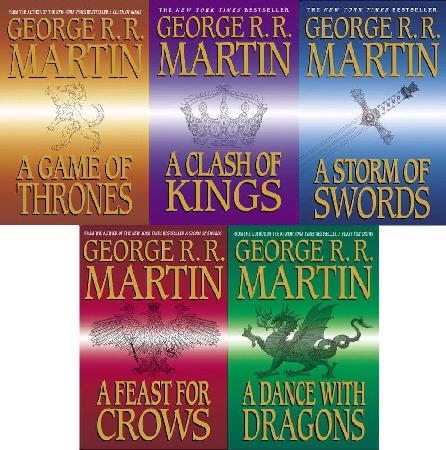
Vox Day: The idea of writing a book that is “like X, only Christian” is entirely repugnant to me. I did not write “a Christian novel”, I am a Christian who wrote a novel in a specific literary tradition. I did not approach the process as a representative of modern evangelical culture, hoping to collect a few crumbs fallen from the medieval feast described in excruciatingly painstaking detail on the secular table, but as one of the legitimate heirs to the literary kingdom who is castigating the usurpers. Now, I very much enjoyed the first three books of A Song of Ice and Fire, but the idea that Martin is, or ever could be, “the American Tolkien” should offend anyone who loves Middle Earth. He would be more accurately described as “an anti-Tolkien” in much the same manner that Philip Pullman is a self-avowed “anti-Lewis”.
Don’t get me wrong. A Game of Thrones is an excellent novel when read in its own context. So are A Clash of Kings and A Storm of Swords. But among their various themes is the subversion and overt mocking of concepts that Tolkien honored, concepts such as honor, courage, commitment, love, loyalty, and family. In Martin’s world, nobility is equated with stupidity; evil and treachery prospers abundantly on every side. While there is something to be said for rejecting the tedious old tropes of good, in the persona of the young farmboy, inevitably saving the world by triumphing over cackling, cartoonish, and cretinous evil, the reaction against the shadow of Tolkien that began with Michael Moorcock has gone much too far into nihilism and moral blindness.
I don’t object to the ugliness, hate, and perversion in A Song of Ice and Fire and other modern epic fantasies. Such things exist in all fallen worlds and must be included for the sake of verisimilitude in any work of sufficient seriousness and scope. Is there not ugliness, hate, and even perversion in the Bible? What I object to is the near-complete absence of beauty, love, and normalcy to oppose them. As I have written in other contexts, I don’t object to modern epic fantasy on moral or religious grounds, but on literary and philosophical grounds. Theories abound as to why the Martin series has declined so dramatically, but the fact that it is written from a nihilistic and overtly anti-heroic perspective may well have contributed to the lower quality of the two more recent books.
ESB: Do you feel Christians may act like they’re ripping off from a “secular” product, even when we have unique stories to offer (based on the Christian origin of the fantasy genre?)
Vox Day:I think they are often sold that way, which is occasionally misleading. It’s not at all hard to understand why some might erroneously conclude that A Throne of Bones must somehow be ripping off A Game of Thrones; the irony is that aside from the title, (which is much more closely akin to that of a Brian McNaughton novel), the length, and the multi-perspective approach, the only modern author from whom I have even borrowed is Joe Abercrombie. And even there, the single chapter concerned features a mild subversion of his cinematic technique. I’m not concerned about it; no one who has read the book seems to feel it can reasonably be described as any sort of ripoff or imitation.
But this sort of thing is hardly unique to Christians. In the game industry, most games are pitched as being “like Farmville, only with aliens” or “Call of Duty, but in space”. The same is true for the film industry. The reality is that in any given industry there are at least 20 imitators of varying levels of ability, and another 250 would-be imitators, for every genuinely innovative creator.
ESB: How is A Throne of Bones doing? What may be next for this series and your writing?

Vox Day: It is doing well. The reviews are very good and Jeff says that it is selling nicely. I’m currently working on the second book in the series, A Crash of Rings, and Hinterlands will be publishing Summa Elvetica in a hardcover volume that will also contain other novellas and short stories set in Selenoth, including “A Magic Broken”, “The Wardog’s Coin”, and “Qalabi Dawn”. And yes, I’m kidding about the title. Book Two will actually be called A Winter of Winds….
ESB: Finally, let’s say I’m not a faceless internet crank but a true friend of yours, likely from church, a strong Christian brother who isn’t an overt legalist. What if I said to you, “Vox, I just don’t think I could read this book ‘with Jesus looking over my shoulder’”? How might you reply to encourage yet challenge him? How might other similar readers respond?
Vox Day: I’d tell simply him not to worry about it. A few of my friends have read the book. Some of my friends have never read any of my books. That being said, I find it bizarre that some Christians who are clearly familiar with Martin, Rowling, Meyer, or even James will still claim to be unable to read books like A Throne of Bones. Read or don’t read, it’s up to you. But spare the rest of us the posturing.
































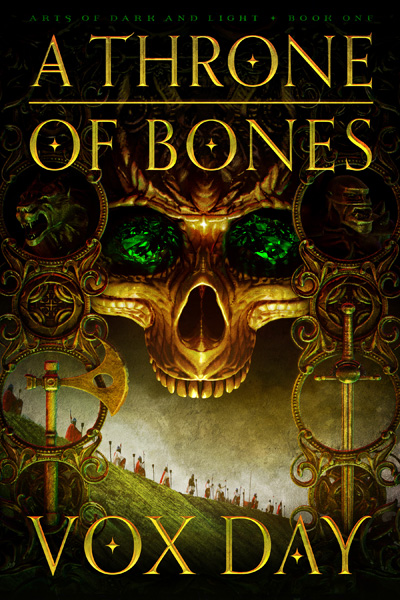
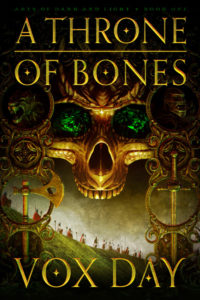



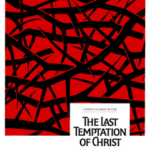



*applause*
I like that, about castigating secular fantasy works. I think I’m going to try to do the same with my YA urban fantasy series.
Seriously, though, if your kid likes AC/DC and you buy him a Sandi Patty album as a putative alternative, you may as well teach him to drink blood and sacrifice goats.
Best laugh I’ve had in months!
Thanks for the excellent interview.
Great interview! I’ve been wanting to read A Throne of Bones since I first heard of it. I think I might move it to the top of my list. 🙂 I agree with MadPiper, that line with AC/DC and Sandi Patty gave me a good laugh.
Bravo! Love the interview.
Great interview Stephen. I have to say that I admire him, but I would not want to be in a room with him. He’s a tad bit acerbic, and sounds a tad condescending, and my attitude is usually to “stick it” to such people. That, and I’m a major Europhobe who argues their current culture devalues the life of the elderly and disabled, and is therefore evil. I usually distrust Liberts, but as long as he doesn’t call me a war criminal and so on like some Liberts in the US have done, I’m fine with the guy.
That said, two questions. First of all, did you get to ask him anything that didn’t go into the interview? Is there anything else you learned about him and his views, on various matters in terms of literature, culture, etc.?
What research did he do on fighting and military stuff, so on? The first few pages I’ve read so far really do have far more believable military characters than much fantasy.
Thanks.
Only one “inside baseball”-style question that I labeled as optional.
Only through the interview; more is at Vox’s blog and, I presume, column archive.
You would certainly know more about that than I would, yet I also found the centurions-vs.-goblins accounts to have that elusive ring of familiar reality.
Feel free to ask Vox Day yourself; I imagine he will see the questions here. 🙂
Really good interview, Stephen, though I seriously doubt if you were asking him anything as a face-to-face friend you’d be addressing him as “Vox.” 😉
Becky
As it happens, many people, including some of my friends, call me Vox and have since I was in college. It was a stage name before it was a pen name.
I was all ready to argue with you about the quality of the Song of Fire and Ice series, then you specified that you thought the first three books were excellent. I just finished Storm of Swords, and have been taking a break before reading A Feast for Crows, so I’ll have to withhold my response until then.
Great interview. I look forward to reading Throne of Bones. Good luck and God bless.
These are some great questions and answers. Now I want to read his book…
I have to say that I admire him, but I would not want to be in a room with him. He’s a tad bit acerbic, and sounds a tad condescending, and my attitude is usually to “stick it” to such people.
I do seem to strike a fair number of people that way, and to occasionally provoke that reaction in others. Which I don’t mind; there are few things I enjoy more than sparring, be it physical sport or intellectual debate. I suspect most of my critics would insist you are far too kind. What most casual observers miss is that I don’t take myself all that much more seriously than I take them.
I’m a major Europhobe who argues their current culture devalues the life of the elderly and disabled, and is therefore evil.
No question. You won’t find a more vehement critic of the EU than me.
What research did he do on fighting and military stuff, so on? The first few pages I’ve read so far really do have far more believable military characters than much fantasy.
I am a lifelong and inveterate wargamer. I’ve read everything from the obscure ancient military treatises by Asclepiodotus and Vegetius to current Marine Corps tactical doctrine. For example, the Sex. Gaerus Frontinus who is often cited by the Amorran officers is the undisguised fantasy version of Sex. Julius Frontinus, the author of the fascinating Strategemata. I didn’t do much actual research for the book, the results were more the distillation of a hobby that has spanned more than three decades. But I’m glad to hear you’re enjoying the military aspects, since you’re going to encounter a lot more of them.
I imagine Charles Oman will feature more heavily in Book Two now that the action has, to some extent, shifted geographically.
I enjoy sparring, too Theodore, but I don’t think that means we have to come off as condescending or vitriolic. I stumbled upon this today in a blog post which struck me as appropriate:
Becky
A quick perusal of his blogs and comments reveals a very unrepentant heart and unchristian attitude towards people.
His misogyny and racism is out there for all to see, its quite alarming how overt it is.
I’m enjoying the novel but the more I read about the man, the more I wish I didn’t. I would not want to be anywhere near this arrogant jerk.
I just finished Storm of Swords, and have been taking a break before reading A Feast for Crows, so I’ll have to withhold my response until then.
Abandon hope, all ye who enter…. To be fair, though, you’ll have to withhold your response until you finish A Dance with Dragons. And to truly experience the full effect, wait six years after finishing Feast, and then dive into Dance.
In retrospect, I’m not sorry that the series went south, because I very much doubt if I would ever have written A Throne of Bones if it hadn’t.
Any Christian fantasy writer who also quotes Zork is officially one of my heroes.
think he might have been quoting Dante, though!
Said it before I did. Didn’t Dante, describing Hell’s cheerful sign-painter, have it first?
I guess so. The inscription on the archway leading to Hades in the 1979 mainframe text adventure actually says “ABANDON ALL HOPE YE WHO ENTER HERE.” I think “EVERY” is substituted for “ALL” in some versions. The people at MIT who wrote Zork/Dungeon were probably referencing Dante, then.
Anyways… I was hoping. 🙁
I wanted to apoligize Sir. You may be simewhat brisk, but your patience and kindness in responses show you to be a .ice person. Thanks for your responses.
On the military question, I ask because you captured the cultire much better than shows and books I’ve seen, where the characters are either too laid back, or too screaming like a bad caricature of Drill Sergeants. You’re very close compared to other fantasy writers to what I saw in the Army. Great job.
I’m loving the book so far (I’ve just.started). When is tge next one due out?
Typing on a tablet stinks. Can’t wait til my repaired computer arrives back home.
I wanted to apoligize Sir.
No need. We are as we are.
I’m loving the book so far (I’ve just.started). When is tge next one due out?
That’s good to hear. Since most people seem to feel it starts slow, you should enjoy the rest of it. Don’t forget to post a review on Amazon! I don’t dare actually say when the next one is due out, since the schedule is somewhere between optimistic and entirely insane. But let’s just say considerably less than the six years between Feast and Dance… and probably less than the two years I promised.
Well, this has been a good lesson for me. An interesting interview. How we sound to other people is important.
From his interview it sounds like Vox had a hard upbringing and his parents are airheads. Maybe he should hook up with Franky Schaeffer.
From his interview it sounds like Vox had a hard upbringing and his parents are airheads.
Quite the opposite, actually. I had a privileged upbringing and my parents are both highly intelligent. But intelligence doesn’t trump culture, for the most part.
“But intelligence doesn’t trump culture, for the most part.” I’ve found this to be true. Otherwise rational people often let go of their logical capacities when it comes to their cultural traditions (Evangelicals and Scientists very nearly create self-fulfilling stereotypes when it comes to this). As somebody of low IQ, I’ve found it much easier to slip through the cracks of culture (fewer expectations, I suspect).
Okay, when you said “Clash of Rings” I was like “what?!” Love the humor. Great interview.
The first half of Thrones of Bones was a page-turner, but now I’m feeling the sag. Hope it picks up again soon before it goes the way of my never-ending, never-finished reading list.
The first half of Thrones of Bones was a page-turner, but now I’m feeling the sag.
Interesting. The general consensus appears to be that it starts rather slow and picks up from there. Then again, even Tolkien had that infernal march through Mordor.
The first battle scene is what kept me reading. It’s very well-written. I often feel scattered and confused in battle scenes, and hence, boredom sets in, but that doesn’t happen here. And then, of course, there’s Marcus. You have many other characters, some of whom I like and some whom I don’t, but at least you always come back to Marcus.
The first battle scene is what kept me reading. It’s very well-written.
It will be interesting to see what you make of a later battle scene… assuming you make it that far.
What other fantasy works (Christian and secular) have you read?
Most of the secular ones. I haven’t read Sanderson’s Mistborn yet, but I’ve read The Way of Kings. Decent, but not particularly good, in my estimation. I particularly like Lloyd Alexander, Susan Cooper, Tanith Lee, Neal Stephenson, William Gibson, and Roger Zelazny. Zelazny may be my biggest influence, although I’ve realized that only in hindsight. I like Abercrombie, don’t like Bakker, and believe Robert Jordan is a cruel, cruel joke on fantasy fans. The only time I’ve ever been tempted to write fan fiction was so that I could kill off that ridiculous whiner, Rand al’Thor.
Guy Gavriel Kay is very good, as is Stephen R. Donaldson. However, my favorite writers are outside the genre, being PG Wodehouse and Umberto Eco.
If you go to Vox Popoli and type “Reading List ” in the blog search box, you can see what books I’ve read over the last three years and how I loosely ranked them. For example, this is my Reading List 2012
On the Christian side, I respect George MacDonald more than I particularly enjoy him. I loved The Tower of Geburah but found the rest of John White’s stuff disappointing. Lewis and Tolkien are the great masters.
Rand al’Thor is a whiner, and as an angsty, whiny teen, I connect greatly with the character, although I always liked Perrin better. I’m probably the closest there is to a WoT fan who is going to speak up here, and it’s readily apparent to me that the series is flawed in many ways. The plot is horrible, and only deteriorates as the series goes on. But I like the worldbuilding, the scope, and some of the characters. I don’t think Jordan devalues the concepts of honor, courage, love, or loyalty as you say Martin does.
(I have not read A Song of Ice and Fire, but I’ve been thinking about picking up A Game of Thrones some day. Maybe it isn’t worth it.)
I was delighted to learn that Throne of Bones has its roots in Summa Elvetica. I ate that story in slow, savoring mouthfuls. Throne of Bones is now second in my review queue for The Christian Manifesto. If Summa Elvetica was a three course meal, it sounds like I am in for a full banquet in Throne of Bones.
I love any story secular or Christian, that tells a riotously good tale, has a moral center (I mean that in the Chesterton sense) and makes me forget that I’m reading a book. Here’s hoping I find all three in
I’m curious Sir. What other fantasy works (Christian and secular) have you read? I heard you liked Brandon Sanderson’s works. Which ones? Have you read the Mistborn books?
The series does have problems, Bainespal, yes. But, as you said, it is a great series for the worldbuilding and magic systems. Of course, Sanderson does far better than Jordan, methinks.
In the series, I disliked Egwene the most, as she was a bully, pure and simple, and more than a mite sadistic at times. To be honest, the most ideal military person is obviously Mat, but the most ideal leader, I think, was Perrin. I mean, at least Rand had the excuse that he was insane at the time. What was the other peoples’ (like Egwene or at times Faile) excuse?
A few questions for the author:
Why did you choose to write under Vox Day when Summa Elvetica was written under your real name? Do you feel that runs a risk of distancing readers from that work, or was that the point? Also, do you feel that in writing a riposte to the likes of Martin, you run the risk of being labeled a Christian knock-off of him? (I am very much intrigued by your interview, but concerned by the titles in particular, as I have a feeling that the similarity could backfire. Remember the criticism of Michael Warden and the comparisons to Stephen Donaldson?)
It’s the name most people know me by now. The Summa hardcover coming out this summer will be published under it as well. I think so few people read Summa in comparison with how many will read Throne that any possible distancing is irrelevant.
I’m not worried about being labled a knock-off. A lot of people seem to find it of reasonably similar quality, and let’s face it, a lot of them need something else to read over the next five years. I mean, if we both keep up our respective paces, I’ll be done with all five books of Arts of Dark and Light before he finishes A Song of Ice and Fire….
Anyhow, I’m just getting started. Arts is not going to follow in Song’s footsteps.
Okay, that makes more sense. Well, here’s to providing those fans an alternative (something I’m rather hoping to do myself). Blessings in your work.
[…] about his journey to publishing this very massive tome. And then, a few days later, Vox Day was interviewed by E. Stephen Burnett for this blog. And in the comments of both posts, there was a lot of hand-wringing and worry about […]
I’m a bit late to this discussion, but I wanted to mention how much I am looking forward to getting this one.
I had gotten Summa Elvetica back when MLP first got started, and I got to say I was surprised with how thin the book was, and then when I got half way through the book and the story I was reading and enjoying was over with already, I just never went back and read the two follow up stories. That may sound strange, but I was enjoying it immensely and felt I had gotten ripped off on that one. Reading this interview lets me see more of why that was the case. Knowing that this book tells me even more from that world will ensure that I finally go back and read the other two stories. 🙂
My main question at this point is this: Is this book one complete novel this time or is it another series of stories?
Oh, and I happen to like Stryper. 😉
I would love to see March Lord Press branch out into other forms of media. Computer games, roleplaying games, etc.
In fact, I think that the world featured in A Throne of Bones would make an excellent setting for a roleplaying game. It would be nice to have a fantasy world where I could play a character that worships Jesus instead of some made up soccer hooligan with divine powers.
Is this book one complete novel this time or is it another series of stories?
It is a complete novel that is the first in a five-book series.
[…] https://speculativefaith.lorehaven.com/on-the-throne-of-bones-a-q-and-a-with-vox-day/ […]
[…] https://speculativefaith.lorehaven.com/on-the-throne-of-bones-a-q-and-a-with-vox-day/ […]